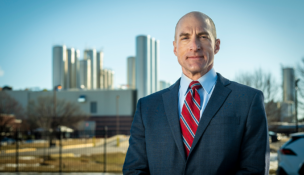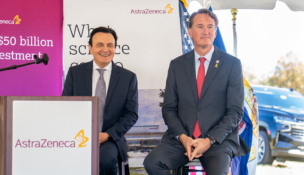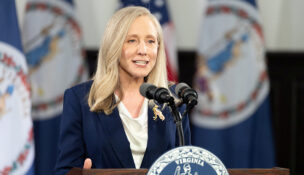Youngkin: Va. Senate making ‘colossal mistake’ in rejecting arena
Plan on life support as GA budget omits authority
Kate Andrews //March 7, 2024//

Gov. Glenn Youngkin speaks to reporters outside the Virginia State Capitol on March 7, 2024.

Gov. Glenn Youngkin speaks to reporters outside the Virginia State Capitol on March 7, 2024.
Youngkin: Va. Senate making ‘colossal mistake’ in rejecting arena
Plan on life support as GA budget omits authority
Kate Andrews //March 7, 2024//
After news broke Wednesday that Virginia lawmakers had dropped all mention of the proposed Alexandria sports arena authority in their amended 2024-26 state budget, Gov. Glenn Youngkin responded Thursday by blasting the Democratic-controlled Virginia State Senate’s leadership, which has killed every opportunity for a floor vote on the arena legislation. “I believe the Senate is about to make a colossal mistake,” Youngkin said in a news conference.
Although the Washington Wizards and Capitals NBA and NHL teams could still move from their Washington, D.C., base to Alexandria if Youngkin can make a deal with legislative budget negotiators before a special session next month to finalize the state budget, chances for the $2 billion public-private project’s success are considerably slimmer now.
Inclusion of language creating a state authority to own the arena and surrounding properties in the lawmakers’ compromise budget released Thursday was the governor’s best chance to keep the $2 billion arena project alive — after two versions of a bill creating an authority were quietly killed earlier in the 2024 General Assembly session.
Sen. Louise Lucas, the powerful chair of the Senate Finance and Appropriations Committee, prevented committee votes on the House of Delegates and Senate versions of the legislation, halting its progress to a Senate floor vote. During the governor’s news conference, Lucas looked on from the state Capitol steps.
A major holdup for Lucas and some other Senate Democrats was Youngkin’s apparent unwillingness to make compromises on Democrats’ priorities, including setting a $15 per hour minimum wage in Virginia by 2026 and setting up a structure for recreational cannabis sales and taxation. Over the past months, the Republican Youngkin has expressed disinclination toward both plans, and Thursday, in response to a reporter, he reiterated that he didn’t “have any interest in the cannabis legislation. … Bluntly, you want to talk about putting a cannabis shop on every corner. I don’t quite get it.”
However, in recent days, the governor put forward a $322 million Hampton Roads toll relief proposal, a priority for Lucas, in exchange for support of the arena deal — but the overture appeared to be too little, too late to gain Lucas’ backing.
The Democratic-controlled House, unlike the Senate, passed the authority creation bill in a bipartisan vote, which Youngkin praised Thursday.
“The speaker and the House of Delegates took the time to learn about this project. They hired outside advisers to confirm its merits,” Youngkin said. “They debated those merits in public and understood the historic opportunity that this would be for all Virginians. On the other hand, the Senate refused to give the single-largest economic development deal in Virginia’s history any serious, meaningful consideration.
“This project has bipartisan support. Had it gotten to the [Senate] floor, it would have passed,” Youngkin added.
In December 2023, Youngkin and majority team owner Ted Leonsis, CEO of Monumental Sports & Entertainment, announced the 9 million-square-foot entertainment campus project as close to a done deal, saying it could create up to 30,000 jobs for Virginia over several decades. With a 2025 groundbreaking, the arena was expected to be completed by 2028 on an accelerated construction schedule, and an economic and fiscal impact report conducted for the city anticipated up to $7.96 billion in annual economic output for the state if the arena was open by 2028.
Also, a February report conducted by George Mason University’s Center for Regional Analysis found that the proposed development would create more than 5,400 workforce-affordable housing units, far exceeding the City of Alexandria’s goal of producing 2,250 residences that people making about 80% or 90% of the area median income could afford.
The $2 billion investment would be supported through bonds issued by the proposed state authority, which would be repaid through annual rent paid by Monumental and arena parking revenues, naming rights and incremental taxes generated by the arena and development of the first phase, Youngkin said in December. Monumental would put forward about $400 million for the project, and the City of Alexandria would contribute $56 million toward construction of the performing arts venue and $50 million toward underground parking development. The land and buildings would be owned by the authority, which would enter into a 40-year lease with the company.
While Alexandria’s mayor and many Virginia business groups, including the Northern Virginia Chamber and the Virginia Economic Developers Association, voiced their support for the proposal, some state lawmakers and Alexandria residents raised objections, chiefly over concerns about public financing of about $1.35 billion of the project’s cost, and traffic and infrastructure impacts. The AFL-CIO’s Virginia member unions announced in February that they opposed the plan over labor agreement disputes with developers.
Although the deal still has a slim chance to survive in the General Assembly’s special session next month, in which the next state budget is likely to be passed, Lucas triumphantly tweeted Wednesday night a photoshopped picture of herself crouching and posing in front of a tombstone with the inscription “Youngkin and [Ted] Leonsis’ $5 billion arena.”
g

















